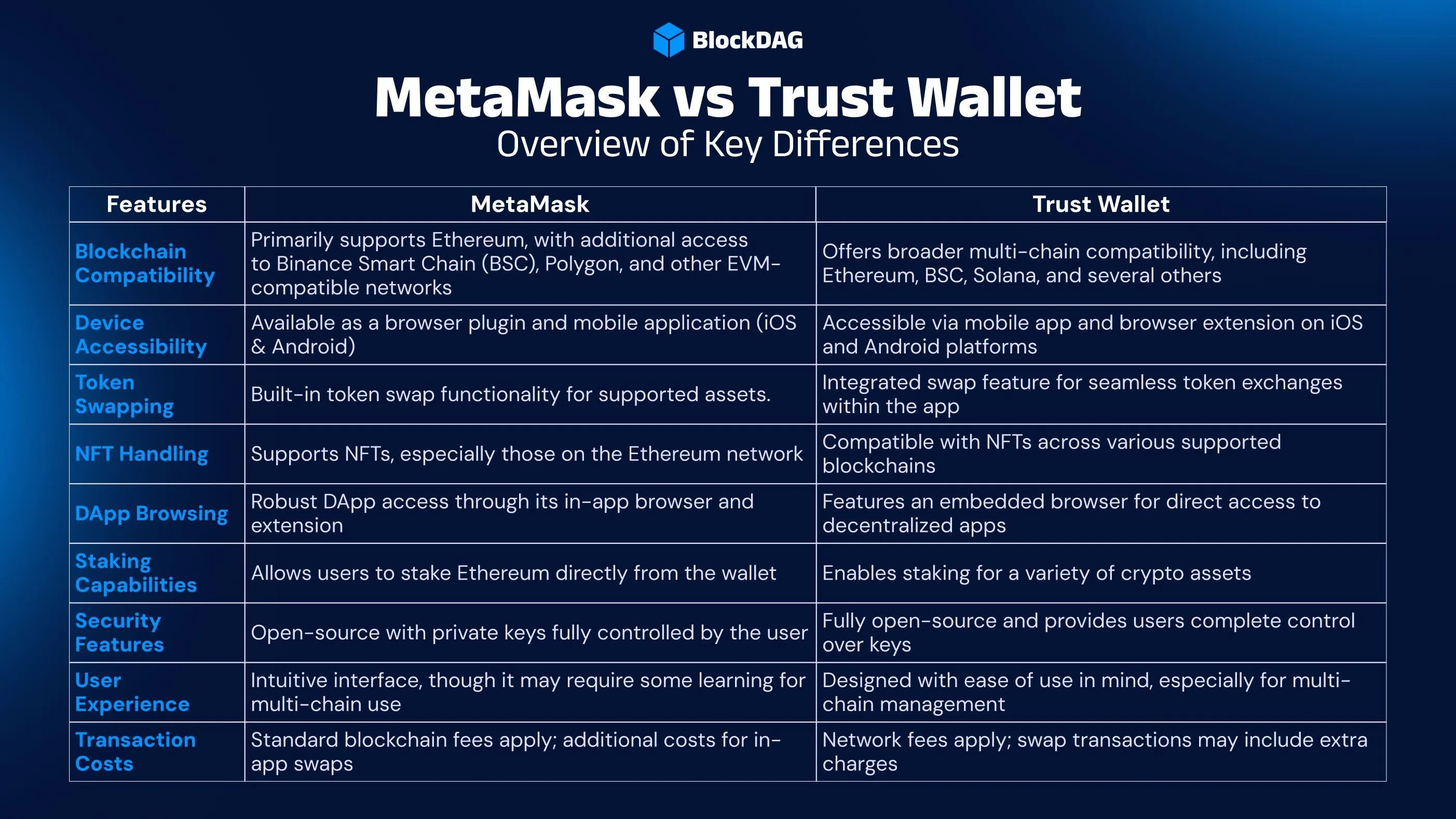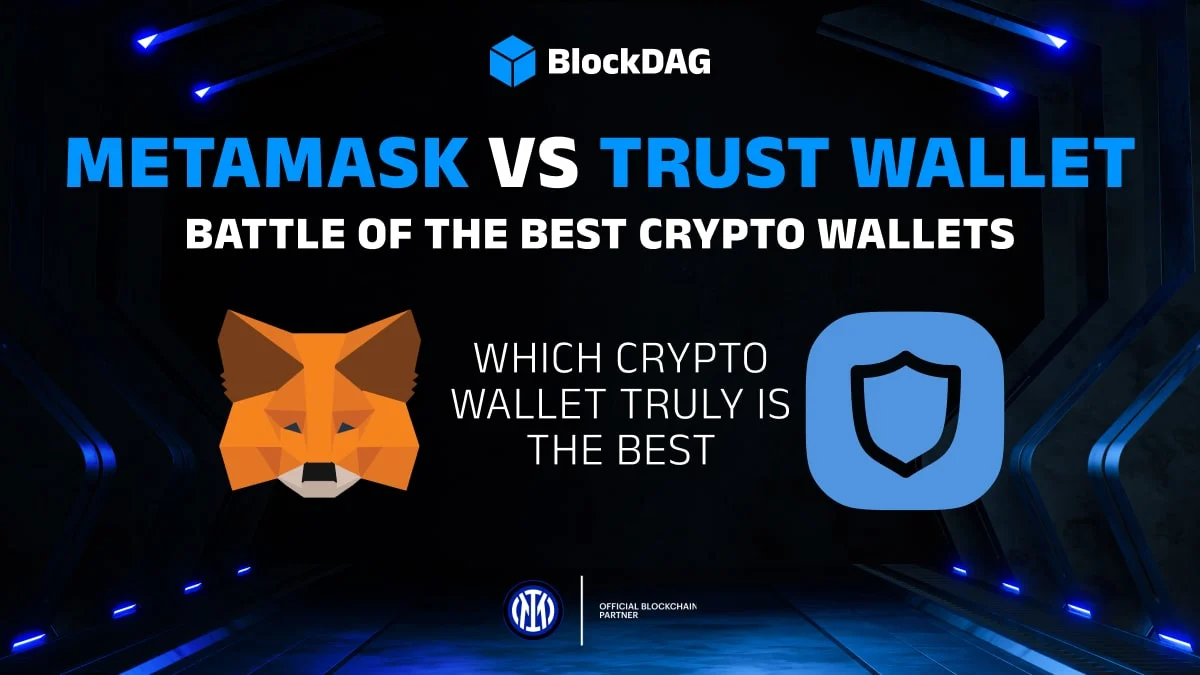MetaMask Vs Trust Wallet - Overview of Key Differences
Trust Wallet vs. MetaMask: Blockchain Compatibility
MetaMask vs Trust Wallet: Token Swapping
Trust Wallet vs MetaMask: NFT Handling
MetaMask vs Trust Wallet: dApp Browsing
Trust Wallet vs MetaMask: Staking Capabilities
MetaMask vs Trust Wallet: Security Features
Trust Wallet vs MetaMask: User Experience
MetaMask vs Trust Wallet: Transaction Costs
So, Which Crypto Wallet Truly is the Best?
The Wallet Wars Are Just The Start - BlockDAG Is The Next Evolution
MetaMask and Trust Wallet are the two most secure and well-known non-custodial cryptocurrency wallets. There are millions of users for both crypto wallets, using them to store, send, and trade different cryptocurrencies across the globe. One of the key reasons for their popularity is the fact that they allow easy access to crypto staking, DeFi projects, and dApps.
The public can use both wallets free of cost, however, there are some additional fees associated with transactions. Both wallets have their own benefits when it comes to comparison. This blog post will compare both wallets head-to-head based on various key features.
MetaMask Vs Trust Wallet - Overview of Key Differences

Let’s discuss and compare all these key features in detail.
Trust Wallet vs. MetaMask: Blockchain Compatibility
MetaMask was initially an Ethereum-only wallet, but it has now evolved to accommodate other EVM-compatible networks, such as Binance Smart Chain and Polygon. These networks must be manually configured in order to be included.
Trust Wallet supports several blockchains by default, including Binance, Solana, Ethereum, and other Layer-1 protocols. It can be a better choice if you intend to use multiple networks without requiring manual configuration.
MetaMask vs Trust Wallet: Token Swapping
The ability to swap tokens is integrated into both wallets. Although MetaMask mostly accepts Ethereum-based tokens, it also incorporates swaps straight into the program. In this way, Trust Wallet is a little more flexible because it offers token swaps for other networks, including Binance Smart Chain (BSC).
Trust Wallet vs MetaMask: NFT Handling
NFTs are supported by both MetaMask and Trust Wallet, however, they are not as user-friendly. MetaMask lacks the greatest user interface for maintaining valuables on other networks and is primarily designed for Ethereum-based NFTs.
A more comprehensive NFT handling experience is offered by Trust Wallet, which supports blockchains other than Ethereum. Trust Wallet might be a better option if you intend to gather NFTs from many networks.
MetaMask vs Trust Wallet: dApp Browsing
Due to its browser plugin, MetaMask is the preferred option for desktop Web3 app interaction. Although it also provides a DApp mobile browser, the performance of a desktop is still better.
A comparable experience is provided by Trust Wallet, which has a desktop browser extension as well as an integrated DApp capability for mobile devices.
Trust Wallet vs MetaMask: Staking Capabilities
A major benefit of Trust Wallet is that it has integrated support for staking a variety of cryptocurrencies, such as XTZ, BNB, and many others. This enables users to generate passive money within the app itself.
MetaMask also provides cryptocurrency staking opportunities, such as liquid, combined, and validator staking in-app, but mostly for Ethereum.
MetaMask vs Trust Wallet: Security Features
Because Trust Wallet and MetaMask are non-custodial, users maintain complete access to their private keys. Additionally, the code of both wallets is open-source, allowing for community auditing.
From a security point of view, both wallets face the same dangers, which are mostly dependent on user risk. Due to user mistakes, both are vulnerable to phishing attacks; however, to safeguard your assets, always pay attention to proper security standards.
Trust Wallet vs MetaMask: User Experience
Since MetaMask is easy to use, integrating non-Ethereum networks involves more manual configuration. This can be rather scary for newcomers, but there are lots of guides available online to help.
Trust Wallet is a superior option for customers who prefer an easy procedure without manually setting networks because it makes multi-chain transactions simpler.
MetaMask vs Trust Wallet: Transaction Costs
Network costs are calculated by both wallets and change based on blockchain traffic. Additionally, when utilizing their integrated exchange functions, both apply nominal swap costs. There is not a major price difference between the two wallets.
So, Which Crypto Wallet Truly is the Best?

When choosing a wallet, consider MetaMask if you want a strong browser extension for easy Web3 interaction. It works well if you mainly focus on Ethereum and networks compatible with it. MetaMask offers a user-friendly way to use decentralized applications (DApps) from your desktop. It is great for users involved in Ethereum's decentralized finance (DeFi) and who want direct access to various DApps on their computers.
Choose Trust Wallet if you want a good experience for managing non-fungible tokens (NFTs). This wallet is useful because it supports multiple blockchains and allows staking, making it ideal for those who like flexibility and want to handle different digital assets. Trust Wallet is designed for mobile use, offering an easy interface for users who prefer to manage their cryptocurrencies and NFTs while on the go.
The best crypto wallet for you depends on your needs. If you are invested in Ethereum DeFi and regularly use DApps on your desktop, MetaMask is a better choice. If your focus is on NFTs and you want a simple mobile wallet that supports various blockchains and has staking features, choose Trust Wallet. Both wallets are good options designed for different user preferences.
The Wallet Wars Are Just The Start - BlockDAG Is The Next Evolution
Having a crypto wallet is a basic need for every cryptocurrency trader. However, other than crypto wallets, there is a lot going on in the blockchain world right now, and BlockDAG is a key player in this ongoing trend of innovation.
One of the main reasons BlockDAG is getting popular among potential investors is the introduction of hybrid models of blockchain and DAG structure. This impressive technology has caught the attention of various investors and institutions at the same time. Raising over $216 million in ongoing presales is a testament of the future of BlockDAG and its demand in the market.
BlockDAG is in its 27th Batch with the price of $0.0248 and has already sold over 19.3 billion tokens. This huge number of presale shows the trust of the investors and the growth of the BlockDAG community.
For those interested in mining, BlockDAG provides an easy-to-use mining calculator. This tool helps users estimate their potential profits based on energy costs and mining power. The platform also offers two effective mining devices. The X10 miner is small and efficient, able to generate up to 200 BDAG per day. The X100 is a high-performance ASIC Miner that can produce up to 2,000 BDAG daily. With over 15,850 units sold, BlockDAG is clearly building a mining community..
BlockDAG is also working to create a strong global community. Its Ambassador Program allows individuals to get involved in different ways, such as promoting the project, hosting events, and educating new users. This program offers hands-on involvement in an exciting venture. Additionally, the team has formed strategic partnerships with major companies, which boosts its credibility and visibility.
While MetaMask and Trust Wallet are useful for managing digital assets, BlockDAG represents a new step forward in cryptocurrency. With its successful presale, practical mining options, growing community, and expanding global presence, BlockDAG is emerging as a significant player in the blockchain space.
